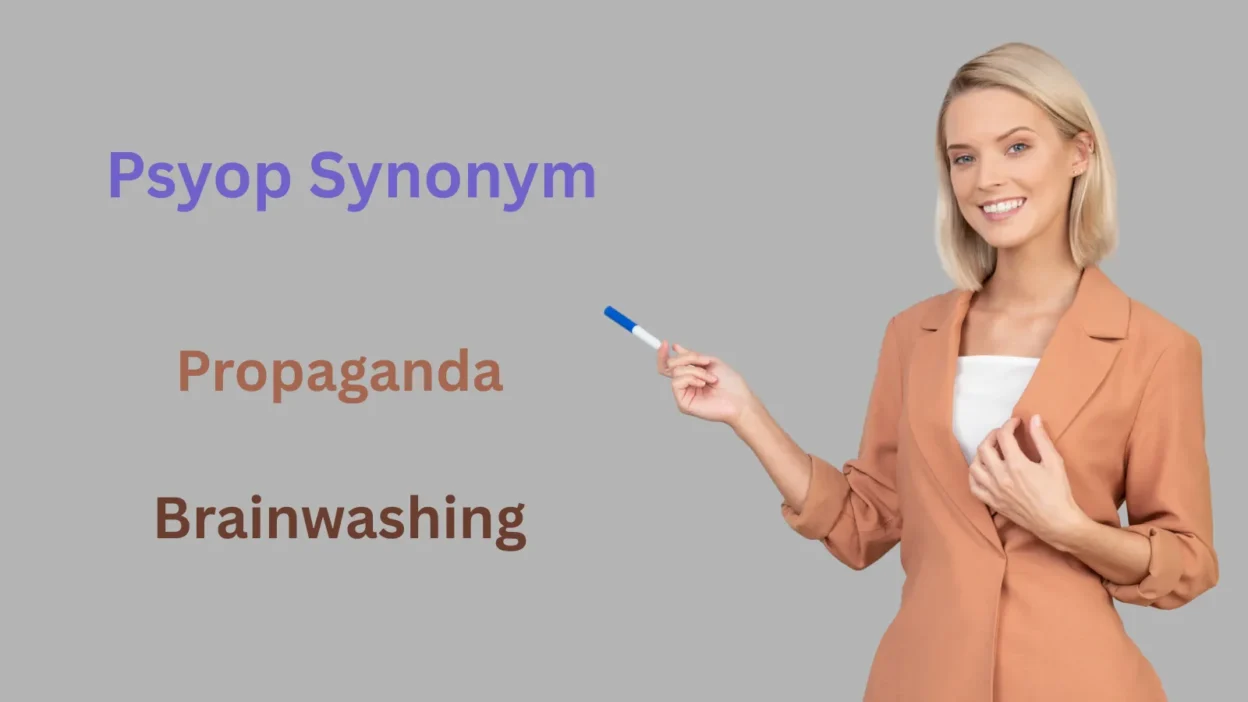Psyop Synonym words like propaganda, mind game, and manipulation describe actions or strategies designed to influence, deceive, or psychologically control others. For example, you might say, “The campaign was pure propaganda,” or “He played a psychological game to gain control.” Each word shows a different side of psychological operations and gaslighting.
If you’re writing about media strategy, political influence, or emotional manipulation, using the right synonym for psyop makes your message sharper, more impactful, and emotionally accurate.
In this guide, you’ll learn the meaning, example, and best context for each psyop synonym, helping you describe psychological tactics—from subtle persuasion to full-scale mental warfare—with clarity and power.
Understanding the Word “Psyop”
The word “psyop” is short for psychological operation, meaning a planned effort to influence the emotions, motives, or behavior of individuals or groups—often for military, political, or social gain.
For example:
- The ad campaign was seen as a government psyop.
- Some social media trends are suspected to be digital psyops.
“Psyop” carries a tone of strategy, psychological abuse, or covert influence, and its synonyms reflect how perception and control are shaped through communication or deception.
30 Synonyms of “Psyop” with Meanings, Examples, and Usage Tips
1. Propaganda
Meaning: Information spread to influence opinions or beliefs.
Example: The film was criticized as state propaganda.
When to Use: Political, media, or social influence contexts.
2. Manipulation
Meaning: Controlling or influencing others cleverly or unfairly.
Example: The politician was accused of emotional manipulation.
When to Use: Emotional, personal, or persuasive situations.
3. Brainwashing
Meaning: Forcing someone to accept beliefs through intense persuasion.
Example: The group was accused of brainwashing its followers.
When to Use: Extreme influence or control scenarios.
4. Indoctrination
Meaning: Teaching someone to accept beliefs uncritically.
Example: The regime used schools for indoctrination.
When to Use: Cultural, political, or educational control.
5. Influence Campaign
Meaning: Coordinated effort to shape public perception.
Example: The agency launched an influence campaign abroad.
When to Use: Political or marketing discussions.
6. Psychological Warfare
Meaning: Use of psychological tactics to weaken an opponent.
Example: The general used psychological warfare to demoralize the enemy.
When to Use: Military, political, or strategic contexts.
7. Deception
Meaning: The act of misleading or lying.
Example: The operation relied on deception and misinformation.
When to Use: General, moral, or strategic situations.
8. Persuasion
Meaning: Convincing others through reason or emotion.
Example: Her speech was a masterclass in persuasion.
When to Use: Positive, ethical influence or communication.
9. Psychological Operation
Meaning: Planned mission to influence emotions or decisions.
Example: The psyop was aimed at spreading confusion among the enemy.
When to Use: Military, intelligence, or covert contexts.
10. Information Warfare
Meaning: Manipulation of information to control perception.
Example: Cyberattacks were part of a wider information warfare campaign.
When to Use: Digital or global security discussions.
11. Mind Game
Meaning: Psychological tactics to confuse or control someone.
Example: He played mind games to make her doubt herself.
When to Use: Informal or emotional manipulation contexts.
12. Misinformation
Meaning: False or misleading information spread unintentionally.
Example: The rumor spread due to online misinformation.
When to Use: Digital, media, or news contexts.
13. Disinformation
Meaning: Deliberate spreading of false information.
Example: The operation spread disinformation to confuse the public.
When to Use: Political, intelligence, or propaganda cases.
14. Narrative Control
Meaning: Shaping how stories or facts are presented.
Example: The company focused on narrative control after the scandal.
When to Use: Media, PR, or corporate communication.
15. Psychological Manipulation
Meaning: Influencing others through emotional or mental tactics.
Example: The show depicted psychological manipulation in toxic relationships.
When to Use: Emotional, interpersonal, or psychological topics.
16. Spin
Meaning: Presenting information with a biased twist.
Example: The press release gave a positive spin on the data.
When to Use: Media, PR, or informal contexts.
17. Influence Operation
Meaning: Coordinated effort to sway public behavior or thought.
Example: Experts uncovered a foreign influence operation on social media.
When to Use: Government, politics, or cybersecurity.
18. Mind Control
Meaning: Total domination of someone’s thoughts.
Example: The cult leader practiced mind control over his followers.
When to Use: Fictional, extreme, or psychological writing.
19. Psychological Tactic
Meaning: Strategy using mental or emotional influence.
Example: The coach used psychological tactics to boost confidence.
When to Use: Sports, motivation, or strategy contexts.
20. Trickery
Meaning: Use of deceit or cunning methods.
Example: The scam was built on clever trickery.
When to Use: Informal, deceitful, or lighthearted tone.
21. Strategic Communication
Meaning: Planned communication to achieve specific goals.
Example: Governments use strategic communication during conflicts.
When to Use: Formal, military, or business communication.
22. Psychological Persuasion
Meaning: Influencing others through emotional understanding.
Example: He used psychological persuasion to win the debate.
When to Use: Academic or behavioral contexts.
23. Mind Manipulation
Meaning: Controlling thoughts through subtle tactics.
Example: The movie explored mind manipulation in society.
When to Use: Literary or psychological discussions.
24. Psychological Strategy
Meaning: A Plan designed to influence mental reactions.
Example: The team used a psychological strategy to outperform rivals.
When to Use: Competitive, military, or sports writing.
25. Influence Engineering
Meaning: Designing systems to guide behavior or thought.
Example: Social media algorithms are a form of influence engineering.
When to Use: Tech, sociology, or digital ethics.
26. Psychological Influence
Meaning: Impact on how people think or feel.
Example: The ad had a strong psychological influence on consumers.
When to Use: Marketing, behavioral, or academic contexts.
27. Manipulative Campaign
Meaning: Coordinated effort to mislead or control people.
Example: The manipulative campaign shaped voter behavior.
When to Use: Politics, PR, or journalism.
28. Thought Control
Meaning: Restricting or directing mental freedom.
Example: The dystopian novel portrayed total thought control.
When to Use: Fictional, philosophical, or political themes.
29. Psychological Conditioning
Meaning: Training the mind to respond a certain way.
Example: The experiment showed how conditioning affects decision-making.
When to Use: Psychology, behavior, or science writing.
30. Cognitive Warfare
Meaning: Manipulating thought processes in conflict situations.
Example: Modern warfare now includes cognitive warfare tactics.
When to Use: Modern military or information-based contexts.
Choosing the Right Synonym for “Psyop”
Choosing the best synonym depends on tone, intensity, and purpose:
- Formal/Strategic: influence operation, cognitive warfare, strategic communication, psychological operation
- Media/Politics: propaganda, narrative control, disinformation, spin
- Emotional/Personal: manipulation, mind game, psychological tactic
- Academic/Psychological: conditioning, persuasion, influence, engineering
- Fictional/Dramatic: mind control, thought control, brainwashing
Cultural Tip:
In Western media, “psyop” often carries a conspiratorial or military tone, while propaganda and spin sound more mainstream. In academic writing, terms like psychological influence or strategic communication are preferred for neutrality.
Conclusion :
Psyop Synonym words reveal how influence and control operate across military, media, and emotional landscapes. From subtle persuasion to total manipulation, each synonym reflects a layer of psychological power.
Choosing the right alternative depends on tone and intent—use strategic terms for analysis, emotional words for storytelling, and formal phrases for intelligence or political writing.
Mastering these synonyms makes your communication more precise, impactful, and psychologically aware.





